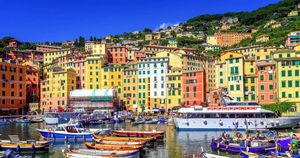On December 16, South Africa marks Reconciliation Day, commemorated as the nation reflects on the lessons learned since the end of apartheid nearly thirty years ago. Yet, the celebrations often stand juxtaposed with the stark reality of persistent inequalities and land access challenges, reminding citizens of the unfinished business following decades of institutionalized racial discrimination.
Ndileka Mandela, the granddaughter of former president Nelson Mandela, recently shared her perspective on the essence of reconciliation. Meeting at a restaurant north of Johannesburg, she emphasized her grandfather's legacy, stating, "My grandfather chose to forgive those who imprisoned him... He chose reconciliation." This sentiment encapsulates the hope for unity and healing post-apartheid.
Despite the noble aspirations of reconciliation, Ndileka Mandela points out, "Even with the work of this commission, the whole truth has not been told... We are very far from reconciliation." Her comments echo the frustrations of many who feel marginalized by unmet promises since Mandela’s time, noting the continued struggles of black South Africans, particularly when it concerns land ownership and economic opportunities.
The past few decades have seen the establishment of various bodies aimed at promoting dialogue and healing within communities, but according to Felicity Harrison from the Institute for Justice and Reconciliation, these efforts are still incomplete. Harrison explains, "It’s still very incomplete today because the Truth and Reconciliation Commission was not created to be the beginning and the end of reconciliation... It was just the first step of a long road.” This acknowledgment highlights the nuances of reconciling with the past and the complex weave of history, injustice, and future aspirations.
Land access remains one of the most contentious areas of discussion. The effects of colonialism and apartheid have left deep scars, marked by the systematic dispossession of land from black populations. Harrison firmly states, "The questions relating to land have not been adequately addressed... We have not advanced on redistribution or compensation which could help heal the wounds of the past." This statement reflects the urgent need for policy changes to rectify historical injustices.
On the more radical front, Julius Malema, leader of the Economic Freedom Fighters (EFF), has been vocal about the necessity of direct action to counter inequality. Recently re-elected for another five-year term, he remarked, "The revolution is not just words; there will come a time when it is necessary to take up arms to reclaim land and mineral resources." This strong rhetoric is indicative of the frustrations felt by many South Africans who believe the current government has fallen short of delivering true economic freedom.
For many young South Africans, the dream articulated by leaders like Nelson Mandela seems distant. Ndileka believes the youth, referred to as “born free,” face monumental challenges, including unemployment and social unrest stemming from systemic inequities. She passionately states, "Our role, today, is to accept where we are and act now! For the youth of thirty years from now to not feel they have regressed.”
With the legacy of apartheid still looming large, December 16 serves as not just a day of remembrance but also one of proactive engagement. On Reconciliation Day, South Africans are called to connect with their communities and work earnestly toward meaningful reconciliation at the grassroots level.
Through initiatives led by entities such as the Nelson Mandela Foundation and various community organizations, South Africans are encouraged to participate actively, fostering dialogue and cooperation aimed at healing the fractures from the past.
The road to reconciliation remains undeniably steep and fraught with challenges, but the voices of individuals, both young and old, echo the collective aspiration for equality, justice, and restoration. The coming generations will carry forward this hopeful banner, fueled by both remembrance and determination as they strive for a future where every South African can genuinely experience freedom and equality.



